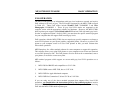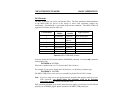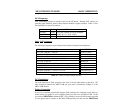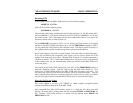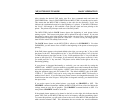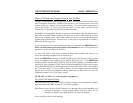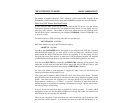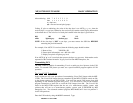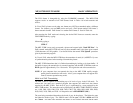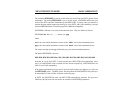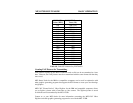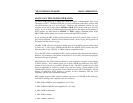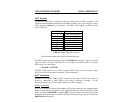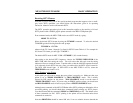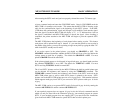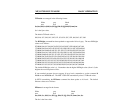
MFJ-1278B MULTI-MODE BASIC OPERATION
The FAX format is changeable by using the FAXMODE command. The MFJ-1278B
supports receive or transmit of all FAX formats listed in Table 4-6 in both transmit and
receive.
In 2 level FAX, pictures saved under one format may NOT be transmitted under a different
format. For instance, you can NOT receive and save a FAX picture under FAX format 3,
then re-transmit it under FAX format 2 or another FAX format as listed in Table 4-6.
After entering the FAX mode and selecting the desired FAX format to transmit, enter the
CONVERSE mode by typing:
K
followed by typing a:
CTRL-T
The MFJ-1278B is now ready to transmit a picture and respond with: "Send PIX Now". In
FAX transmit mode MFJ-1278B will not key the transmitter until it has been given around
1,500 characters of FAX graphics. User should follow the normal "File Upload" procedure
given by the terminal program.
In 2 levels FAX, when the MFJ-1278B keys the transmitter it sends (6* (ASPECT+1)) rows
of synchronization pulses before starting to transmit the picture.
The MFJ-1278B determines that it is finished transmitting by looking at its input buffer: If
the buffer is empty, the transmission is assumed complete, and the MFJ-1278B then sends an
IDLE signal for approximately 15 to 18 seconds. This signals the end of the transmission.
NOTE: If your computer does not transmit the data to the MFJ-1278B rapidly enough,
partial picture transmission will result. Also if your computer does not support flow
control, incorrect operation may result.
Multi-level FAX Transmitting
The MFJ-1278B is capable of transmitting up to 16 levels of gray in the FAX mode. To
achieve this you must use a terminal program that supports the multi-level data format
required by the MFJ-1278B. Each level of gray is represented by a tone produced by the
MFJ-1278B modem. The tones that can be produced by the MFJ-1278B FAX/SSTV modem
are: 1100, 1200, 1300, 1500, 1550, 1600, 1650, 1700, 1750, 1800, 1850, 1900, 1950, 2000,
2050, 2100, 2150, 2200, and 2250. All frequencies are in KILOHERTZ (kHz.).
The tone being transmitted determines the shade of gray in the picture. The higher the tone
the lighter the shade of gray. The 1500 Hz tone is for the sync, 1550 Hz is black and 2250
Hz is
white
. The other tones determine t
he shades of gray between the black and the white



